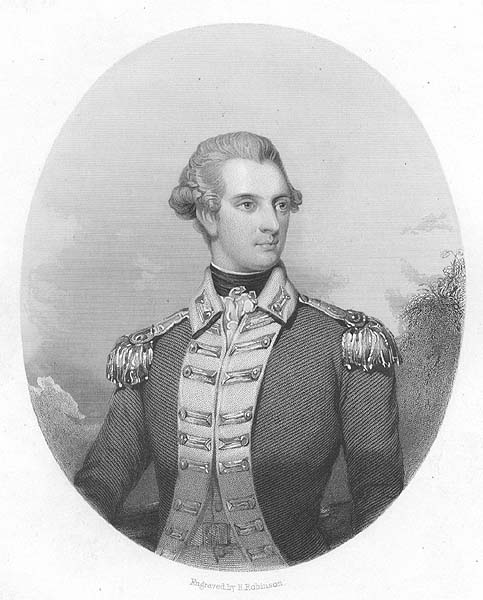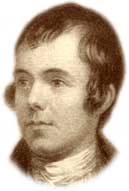Robert Burns

Cunningham, James, fourteenth Earl of Glencairn (1749 — 91)
He was born at Finlayston, the second son of the thirteenth earl. For a time he served as a Captain in the West Fencible Regiment. His elder brother having predeceased him, James Cunningham succeeded his father as fourteenth Earl in 1774. From 1780 to 1784 he was one of  the Representative Scots Peers in the House of Lords. While ther, he supported Fox's India Bill. In 1784, Glencairn, as patron of Kilmarnock parish, presented a staunch Conservative, the Rev William Mackinlay, to fill the vacancy, though Glencairn himself was not apparently an Auld Licht supporter, his desire being to fulfil the wishes of the majority of the parishioners. The appointment, however, produced Burns's satire 'The Ordination'. Glencairn's factor, Alexander Dalziel, drew the Earl's attention to the Kilmarnock Edition by which he was much impressed. When Burns arrived in Edinburgh in 1786, armed with a letter of introduction from Dalrymple of Orangefield (who was married to Lady Glencairn's sister), the Earl received the poet warmly in his house and introduced him to his friends. On of these was the Dean of the Faculty of Advocates, Henry Erskin, who in his turn introduced Burns to the Duchess of Gordon. Another was the publisher, William Creech, who had once been Glencairn's tutor and travelling companion. Burns afterwards described Glencairn as his 'titular Protector'. He told Mrs Dunlop, in a letter of 22nd March 1787: 'The noble Earl of Glencairn, to whom I owm more than any man of earth, does me the honor of giving me his strictures; his hints, with respect to impropriety or indelicacy, I follow implicitly.' Clearly, Glencairn was able to extend to Burns the benefits of his patronage without upsetting the poet's sensibility. In fact, he was to Burns in Edinburgh pretty much what Gavin Hamilton had been to Burns in Ayrshire. When the subscription list for the 1787 edition of Burns's Poems was opened, Glencairn and his mother took 24 copies. As a result of the Earl's influence, within 10 days of the poet's arrival in Edinburgh, the Caledonian Hunt subscribed 'universally one and all', accounting for 100 copies. When the book was about to appear, Burns asked the Earl's permission to publish in an Edinburgh newspaper his 'Verses Intended to be written below a Noble Earl's Picture'. Glencairn did not give his permission, however, possibly feeling that such advertising would be too blatant.
the Representative Scots Peers in the House of Lords. While ther, he supported Fox's India Bill. In 1784, Glencairn, as patron of Kilmarnock parish, presented a staunch Conservative, the Rev William Mackinlay, to fill the vacancy, though Glencairn himself was not apparently an Auld Licht supporter, his desire being to fulfil the wishes of the majority of the parishioners. The appointment, however, produced Burns's satire 'The Ordination'. Glencairn's factor, Alexander Dalziel, drew the Earl's attention to the Kilmarnock Edition by which he was much impressed. When Burns arrived in Edinburgh in 1786, armed with a letter of introduction from Dalrymple of Orangefield (who was married to Lady Glencairn's sister), the Earl received the poet warmly in his house and introduced him to his friends. On of these was the Dean of the Faculty of Advocates, Henry Erskin, who in his turn introduced Burns to the Duchess of Gordon. Another was the publisher, William Creech, who had once been Glencairn's tutor and travelling companion. Burns afterwards described Glencairn as his 'titular Protector'. He told Mrs Dunlop, in a letter of 22nd March 1787: 'The noble Earl of Glencairn, to whom I owm more than any man of earth, does me the honor of giving me his strictures; his hints, with respect to impropriety or indelicacy, I follow implicitly.' Clearly, Glencairn was able to extend to Burns the benefits of his patronage without upsetting the poet's sensibility. In fact, he was to Burns in Edinburgh pretty much what Gavin Hamilton had been to Burns in Ayrshire. When the subscription list for the 1787 edition of Burns's Poems was opened, Glencairn and his mother took 24 copies. As a result of the Earl's influence, within 10 days of the poet's arrival in Edinburgh, the Caledonian Hunt subscribed 'universally one and all', accounting for 100 copies. When the book was about to appear, Burns asked the Earl's permission to publish in an Edinburgh newspaper his 'Verses Intended to be written below a Noble Earl's Picture'. Glencairn did not give his permission, however, possibly feeling that such advertising would be too blatant.
On 4th May 1787, when Burns was leaving Edinburgh he sent Glencairn a somewhat stilted but obviously sincere letter thanking him for 'all that patronage, that benevolence, and that friendship with which you have honored me.'
In January 1788, when Burns had decided that he must enter the Excise service, he wrote to Glencairn asking his assistance in getting him an appointment.
Glencairn never married and never enjoyed good health. In the autumn of 1790 his health began to fail and he went to Lisbon in search of relief. He returned soon after landing, on 30th January 1791.
In the letter accompanying his 'Lament for James, Earl of Glencairn', which Burns sent to Dalziel on 10th March he says 'God knows what I have suffered at the loss of my best Friend, my first my dearest Patron and Benefactor; the man to whom I owe all that I am and have!' (from The Burns Encyclopedia online)

|
"Lament for James, Earl of Glencairn"
a poem by Robert Burns The wind blew hollow frae the hills, He lean’d him to an ancient aik,
Whose trunk was mould’ring down with years; 10
His locks were bleached white with time,
His hoary cheek was wet wi’ tears!
And as he touch’d his trembling harp,
And as he tun’d his doleful sang,
The winds, lamenting thro’ their caves, 15
To Echo bore the notes alang.
“Ye scatter’d birds that faintly sing,
The reliques o’ the vernal queir!
Ye woods that shed on a’ the winds
The honours of the agèd year! 20
A few short months, and glad and gay,
Again ye’ll charm the ear and e’e;
But nocht in all-revolving time
Can gladness bring again to me.
“I am a bending agèd tree, 25
That long has stood the wind and rain;
But now has come a cruel blast,
And my last hald of earth is gane;
Nae leaf o’ mine shall greet the spring,
Nae simmer sun exalt my bloom; 30
But I maun lie before the storm,
And ithers plant them in my room.
“I’ve seen sae mony changefu’ years,
On earth I am a stranger grown:
I wander in the ways of men, 35
Alike unknowing, and unknown:
Unheard, unpitied, unreliev’d,
I bear alane my lade o’ care,
For silent, low, on beds of dust,
Lie a’ that would my sorrows share. 40
“And last, (the sum of a’ my griefs!)
My noble master lies in clay;
The flow’r amang our barons bold,
His country’s pride, his country’s stay:
In weary being now I pine, 45
For a’ the life of life is dead,
And hope has left may aged ken,
On forward wing for ever fled.
“Awake thy last sad voice, my harp!
The voice of woe and wild despair! 50
Awake, resound thy latest lay,
Then sleep in silence evermair!
And thou, my last, best, only, friend,
That fillest an untimely tomb,
Accept this tribute from the Bard 55
Thou brought from Fortune’s mirkest gloom.
“In Poverty’s low barren vale,
Thick mists obscure involv’d me round;
Though oft I turn’d the wistful eye,
Nae ray of fame was to be found: 60
Thou found’st me, like the morning sun
That melts the fogs in limpid air,
The friendless bard and rustic song
Became alike thy fostering care.
“O! why has worth so short a date, 65
While villains ripen grey with time?
Must thou, the noble, gen’rous, great,
Fall in bold manhood’s hardy prim
Why did I live to see that day—
A day to me so full of woe? 70
O! had I met the mortal shaft
That laid my benefactor low!
“The bridegroom may forget the bride
Was made his wedded wife yestreen;
The monarch may forget the crown 75
That on his head an hour has been;
The mother may forget the child
That smiles sae sweetly on her knee;
But I’ll remember thee, Glencairn,
And a’ that thou hast done for me!”
|
 |
For a good English translation of this poem, go to The World Burns Club





Copyright Cunningham Family Website - All Rights Reserved